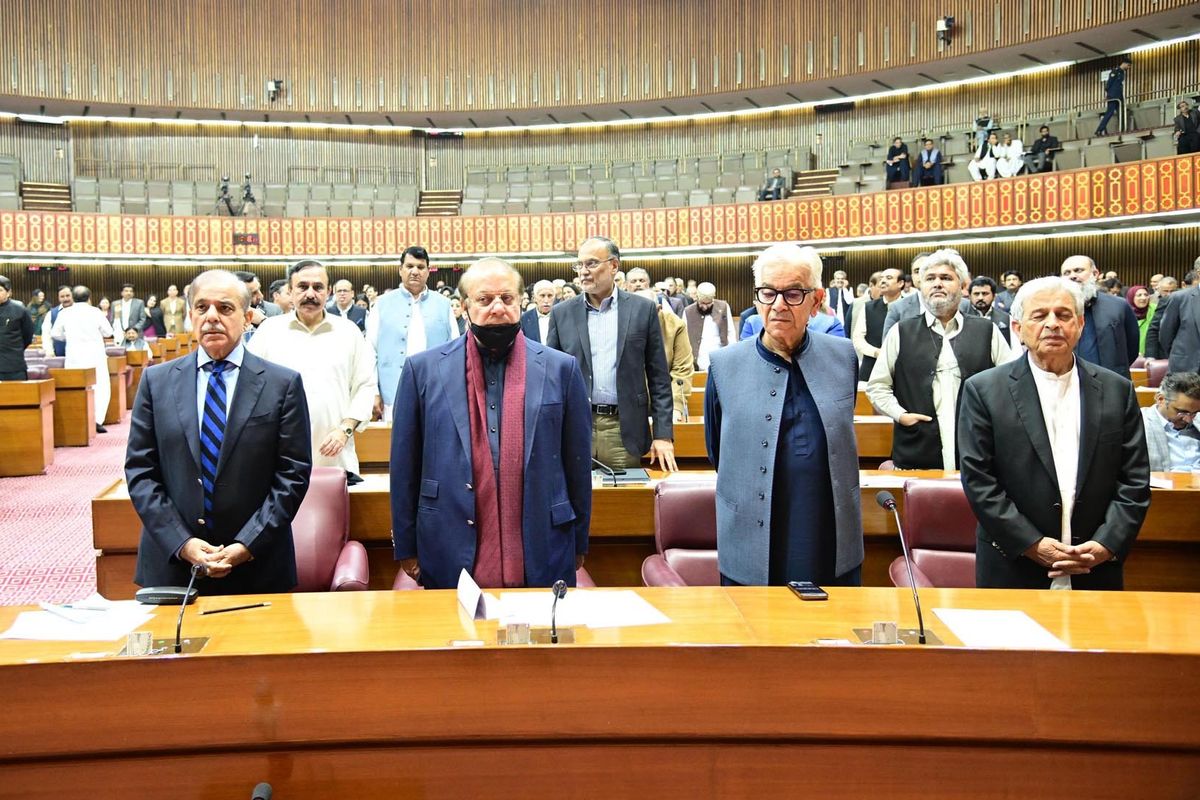Behind closed doors: What really happened during the 26th Amendment vote
Secretive arrival of PTI-backed lawmakers and media restrictions marked sessions of Senate and National Assembly

Javed Hussain
Correspondent
I have almost 20 years of experience in print, radio, and TV media. I started my career with "Daily Jang" after which I got the opportunity to work in FM 103, Radio Pakistan, News One, Ab Tak News, Dawn News TV, Dunya News, 92 News and regional channels Rohi TV, Apna Channel and Sach TV where I worked and gained experience in different areas of all three mediums. My journey from reporting to news anchor in these organisations was excellent. Now, I am working as a correspondent with Nukta in Islamabad, where I get the opportunity of in-depth journalism and storytelling while I am now covering parliamentary affairs, politics, and technology.

Prime Minister Shehbaz Sharif with his brother PML-N President Muhammad Nawaz Sharif and other PML-N members casting their vote clause-by-clause to pass the 26th constitutional amendment bill on October 21, 2024.
PID
The 26th Amendment bill was passed by Pakistan’s parliament early Monday morning, but not without its fair share of controversies, as political maneuvering and high-handed tactics were on full display.
Tight security, media restrictions, and government efforts to keep key lawmakers hidden from public view marked the session, which faced opposition protests and boycotts.
After securing approval from the Senate late Sunday, the government sought to push the 26th amendment through the National Assembly despite lacking the necessary two-thirds majority. To overcome this challenge, PTI-backed independent lawmakers were discreetly brought to the assembly under heavy security. They were strategically seated on government benches, ensuring the amendment’s passage with the required votes.
The assembly convened in a special session that began late on the night of October 20 and extended into the early hours of October 21. Heightened security measures were implemented across the building, with a focus on Gate No. 5 and the parking area leading to the Speaker's Office. Even access to the fourth-floor committee room number seven was tightly controlled, with sergeants from the parliament stationed at key points to prevent “unauthorized” entry.
Secret arrival of lawmakers
Sources within the assembly revealed to Nukta that several independent lawmakers, whose votes were crucial for passing the amendment, were brought into the parliament hours before the session began.
PTI had earlier accused the government of abducting 11 of its MNAs and Senators. Among those escorted into the assembly under tight security were Chaudhry Ilyas, Usman Ali, Mubarak Zeb, and Aurangzeb Khichi, who were seated on government benches.
Additionally, other PTI-backed lawmakers, including Riaz Fatyana, Zain Qureshi, Muhammad Miqdad Ali Khan, and Aslam Ghumman, were stationed in the government gallery as “backups”.
The movement of these lawmakers was carefully controlled, with routes restricted from the Speaker’s chamber on the fourth floor to the government lobby, keeping their presence concealed from the media. Strict protocols were enforced to prevent any leaks or observations by journalists.
Restrictions on media
The press gallery was subject to severe limitations during the session. On Friday, the National Assembly Secretariat had imposed a ban on the use of mobile phones in the press gallery and restricted access for non-essential personnel.
During the Senate session, internet access in the press gallery was completely cut off, while in the National Assembly’s press gallery, internet connectivity was severely limited. Passes for guests were not issued, and even one-day passes for journalists were drastically reduced.
When the National Assembly session finally began, a last-minute shift occurred just before the vote on the 26th Constitutional Amendment. Five independent lawmakers, including four PTI-backed members and one who recently joined the Pakistan Muslim League-Nawaz (PML-N), were quietly escorted from the government lobby to their seats on the government benches. The tight control ensured that the media and opposition members could not spot them until after they had taken their places.
Journalists in the press gallery struggled to observe the proceedings, as they were confined to a limited view that only allowed them to see the opposition benches and part of the government side. A half-wall in the gallery further obstructed visibility, hiding those seated in the lower rows from sight.
Reporters attempting to get a clearer view were stopped by security personnel patrolling the gallery. Several journalists had confrontations with these officers, which escalated to heated arguments over the restrictions.
The arrival of the independent lawmakers triggered an outcry from the opposition benches. Shouts of “turncoats” echoed in the chamber as the opposition accused the government of manipulating the vote. Despite the opposition's protests and boycott, the 26th Constitutional Amendment was passed with the required two-thirds majority.
Adding to the secrecy surrounding the vote, the state-run media heavily censored the opposition's activities, leaving many of their objections unseen by the public.
Following the amendment’s passage, the independent lawmakers swiftly disappeared from the chamber, avoiding the traditional entry and exit routes used by other members. According to sources, they were escorted out through secret passageways.










Comments
See what people are discussing